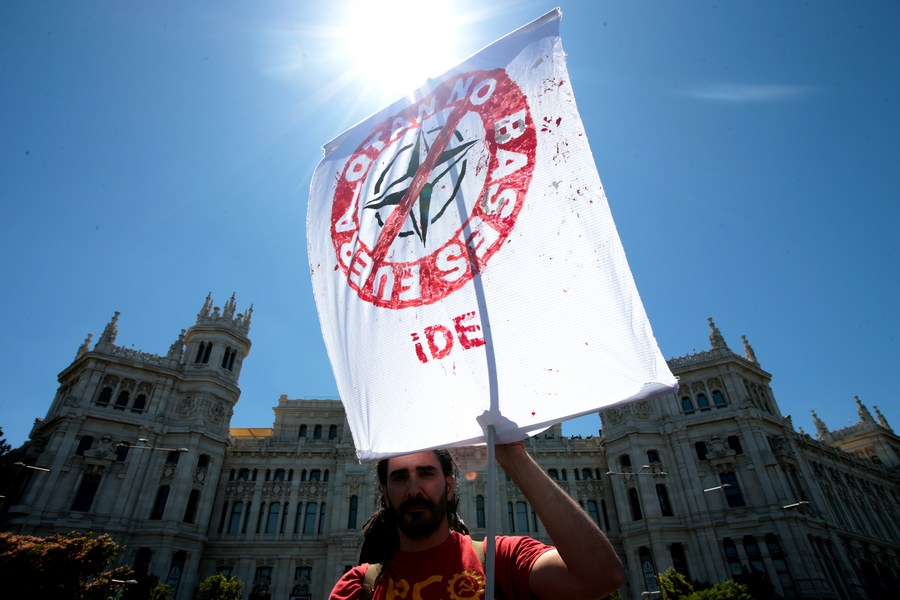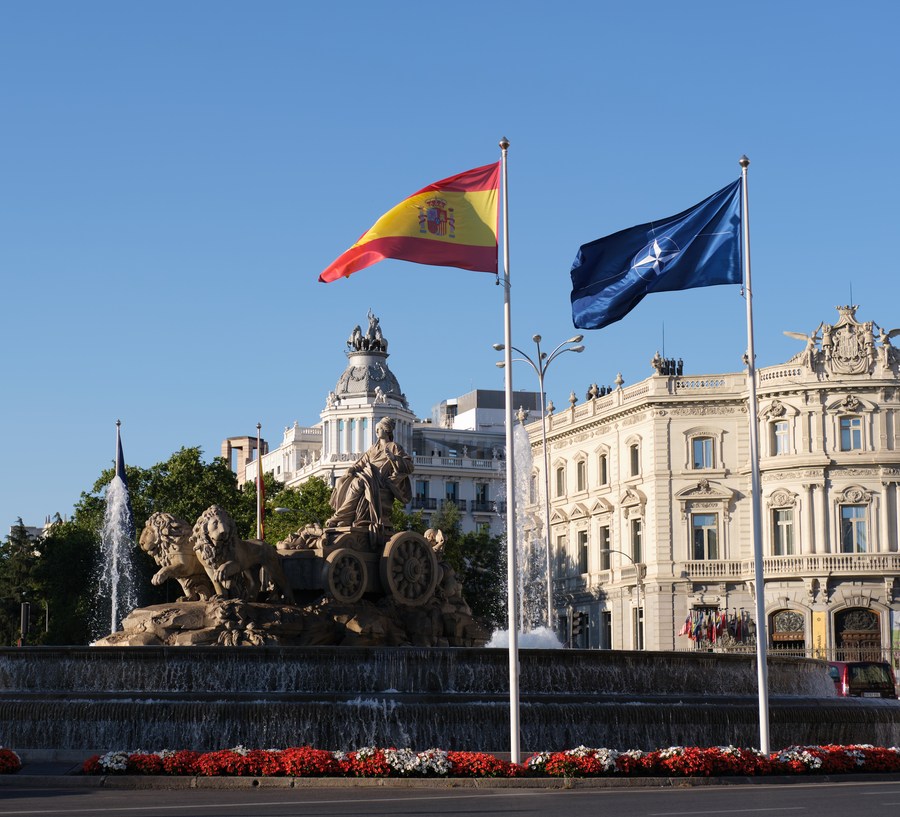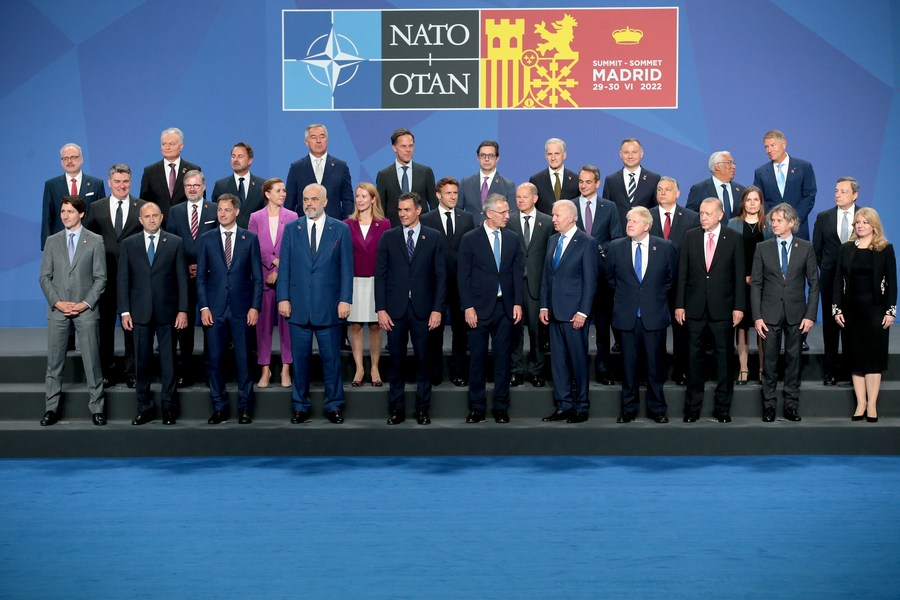NATO expansion only begets confrontation, threatening global security
* NATO's latest northward expansion amid the ongoing Ukraine crisis poses a grave challenge to global security, especially in the Baltic Sea region and the North Pole region.
* Instead of making "them (Sweden and Finland) safer, NATO stronger, and the Euro-Atlantic area more secure," analysts fear that such accession would only upend the security landscape of Europe and eventually invite disasters.
* NATO has repeatedly said that its role as a regional alliance remains unchanged, and it does not seek to expand its influence in other regions. But what the bloc is doing tells a different story.
MADRID, June 30 (Xinhua) -- NATO has formally invited Sweden and Finland to join the military alliance, a sign of how deeply "the product of the Cold War" indulges itself in ideological confrontation and bloc politics.
While emphasizing self-proclaimed security assurances for members, its latest northward expansion amid the ongoing Ukraine crisis poses a grave challenge to global security, especially in the Baltic Sea region and the North Pole region, experts have said.

A man takes part in a protest against NATO in Madrid, Spain, June 26, 2022. (Photo by Juan Carlos Rojas/Xinhua)
ESCALATING CONFRONTATION
Amid highly tightened security measures and widespread discontent from demonstrators, NATO member leaders gathered in Madrid for its 2022 summit, where Sweden and Finland -- two Nordic countries with longstanding neutral and military non-alignment policies -- have been formally invited to join the bloc.
NATO's expansion is bound to further increase Russia's sense of insecurity and trigger corresponding countermeasures as Finland's accession and its 1,300 km land border with Russia would more than double NATO's territorial boundaries with Russia.
Instead of making "them (Sweden and Finland) safer, NATO stronger, and the Euro-Atlantic area more secure" as NATO has promised, analysts fear that such accession would only upend the security landscape of Europe and eventually invite disasters.
NATO's expansion and its reactions to the Ukraine crisis "will create huge socioeconomic and political problems and even upheavals in Europe as time goes by," Jan Oberg, director of the Transnational Foundation for Peace and Future Research, said in a recent interview with Xinhua.
He said Europe and the whole world are now "in a more dangerous situation than we have ever been" in the past decades, and that "NATO is responsible for the underlying conflict built upon the perverse idea that there are no limits to expansion. And it continues."

NATO flag and Spanish national flag are seen in Madrid, Spain, June 28, 2022. (Xinhua/Meng Dingbo)
Croatian political analyst Zarko Puhovski said that NATO's expansion and Russia's strong reaction are bound to result in "long and unfriendly borders," which could eventually spark conflicts.
Zhang Jun, China's permanent representative to the United Nations, noted on Tuesday that NATO's five eastward expansions after the Cold War have not only failed to make Europe securer, but also sowed the seed of conflict.
"The Cold War ended a long time ago. It is necessary for NATO to reconsider its own positioning and its responsibilities, completely abandon the Cold War mentality that is based on bloc confrontation, and strive to build a balanced, effective, and sustainable European security framework in line with the principle of indivisible security," he said.
TOOL FOR HEGEMONY
While promoting northward expansion in disregard of Russia's security concerns, NATO declared Russia as the "most significant and direct threat" to its members' peace and security at the Madrid summit in a new Strategic Concept, its once-in-a-decade set of priorities and goals.
Analysts said the move shows that NATO is now little more than a tool for Washington to maintain its hegemony. The so-called new Strategic Concept is only "old wine in a new bottle," which has not changed the Cold War mentality of bloc confrontation.
Stephen Ndegwa, an international relations lecturer at the Nairobi-based United States International University-Africa in Kenya, said NATO's main objective is to maintain dominance over other countries, he said, adding that by mobilizing more Western countries to join, NATO may further stoke the fires of the Russian-Ukraine crisis.

Participants of the 2022 NATO Summit pose for a group photo in Madrid, Spain, June 29, 2022. (Photo by Juan Carlos Rojas/Xinhua)
Russian Deputy Foreign Minister Sergei Ryabkov expressed his doubts by saying that Russia condemns the "irresponsible course" of the military alliance that is "ruining the European architecture, or what is left of it."
Meanwhile, China is labeled for the first time as a "systemic challenge" in the Strategic Concept.
"China pursues an independent foreign policy of peace. It does not interfere in other countries' internal affairs or export ideology, still less engage in long-arm jurisdiction, economic coercion or unilateral sanctions. How could China be labeled a 'systemic challenge'?" China's Foreign Ministry spokesperson Zhao Lijian said at a press briefing on Tuesday.
ILL INTENTIONS FOR ASIA PACIFIC
In an effort to contain China, U.S. officials and their NATO allies have been aggressively trumpeting the view that China, an East Asian country, threatens Euro-Atlantic security.
Washington, which has been trying to entrench its influence in Asia for decades, has invited its Asia-Pacific followers, including Japan, South Korea, Australia and New Zealand, to take part in the NATO summit for the first time.
NATO has repeatedly said that its role as a regional alliance remains unchanged, and it does not seek to expand its influence in other regions. But what the bloc is doing tells a different story.

Police stand guard at the blocked Plaza Mayor in Madrid, Spain, June 28, 2022. (Xinhua/Meng Dingbo)
"NATO wants to be global," Xulio Rios, director of the Observatory of Chinese Politics in Spain, said in an interview with Xinhua on the eve of the summit.
NATO has been flexing its muscles in the Asia-Pacific region in recent years, trying to bring the pattern of bloc confrontation from Europe to the Asia-Pacific region.
Former NATO Secretary General Javier Solana said NATO's expansion and its pursuit of a stronger presence in Asia will make it more difficult for NATO members to interact with other countries that do not see China or Russia as enemies or rivals. They do not want to take sides between China, Russia and the West.
Solana warned that a "global NATO" or "NATO plus" could divide the world into adversarial blocs.
(Reporters Meng Dingbo in Madrid and Zhu Shaobin in Nairobi also contributed to the story.)
Photos
Related Stories
- Interview: Finland, Sweden's accession will weaken NATO, says Greek scholar
- NATO summit opens amid controversy, internal discord
- NATO itself is the cause of trouble, China opposes 'Asia-Pacific version of NATO': Chinese UN representative
- Ukrainian president urges more defense, financial aid at NATO summit
- Chinese envoy urges NATO not to fan block confrontation using Ukraine crisis as excuse
Copyright © 2022 People's Daily Online. All Rights Reserved.









